 Petzlover
Petzlover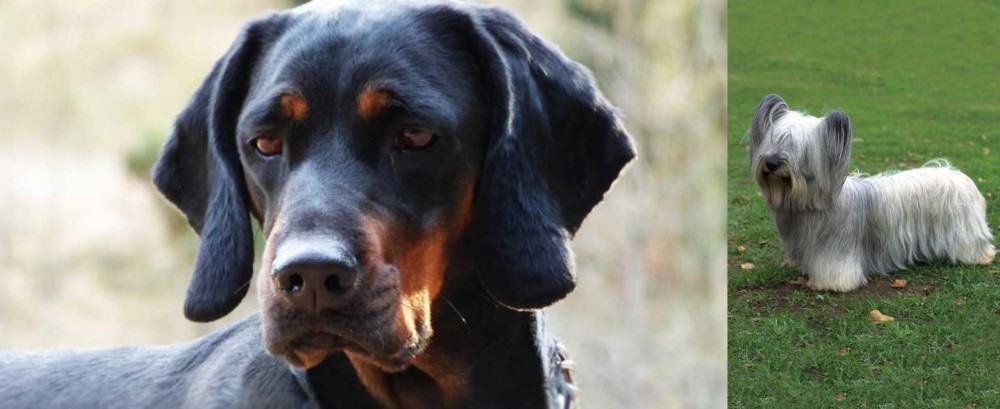 Polish Hunting Dog is originated from Poland but Skye Terrier is originated from United Kingdom. Polish Hunting Dog may grow 40 cm / 16 inches higher than Skye Terrier. Polish Hunting Dog may weigh 14 kg / 31 pounds more than Skye Terrier. Both Polish Hunting Dog and Skye Terrier has almost same life span. Polish Hunting Dog may have more litter size than Skye Terrier. Polish Hunting Dog requires Low Maintenance. But Skye Terrier requires Moderate Maintenance
Polish Hunting Dog is originated from Poland but Skye Terrier is originated from United Kingdom. Polish Hunting Dog may grow 40 cm / 16 inches higher than Skye Terrier. Polish Hunting Dog may weigh 14 kg / 31 pounds more than Skye Terrier. Both Polish Hunting Dog and Skye Terrier has almost same life span. Polish Hunting Dog may have more litter size than Skye Terrier. Polish Hunting Dog requires Low Maintenance. But Skye Terrier requires Moderate Maintenance
 The Polish Hunting Dog originates from Poland and is a purebred scenthound. Hunting with scent hounds goes right back to the 13th century, being highly esteemed by Polish nobility.
The Polish Hunting Dog originates from Poland and is a purebred scenthound. Hunting with scent hounds goes right back to the 13th century, being highly esteemed by Polish nobility.
The famous Polish cynologist, Jozef Pawuslewicz hunted with Polish scent hounds and was part of the development of breeding this dog.
He wrote the first breed standard and the dog was officially registered by the Polish Cynological Association.
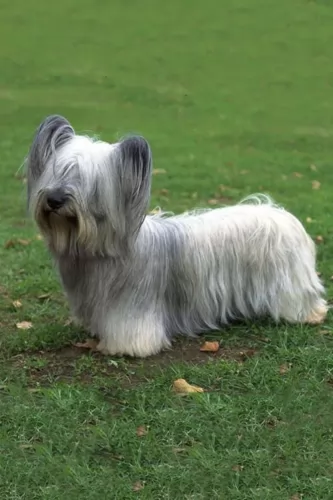 The Skye Terrier is a hardy dog breed and is actually considered to be an endangered native dog breed in the United Kingdom.
The Skye Terrier is a hardy dog breed and is actually considered to be an endangered native dog breed in the United Kingdom.
They were found on the Isle of Skye, although there is some confusion about its history. They were used long ago to hunt but these days they are essentially companion dogs.
They found their way to America and the Skye Terrier Club of America was founded in 1938. The American Kennel Club recognized the breed in 1887.
 The Polish Hunting Dog is a large, strong dog standing between 50 – 66cm in height and weighing between 20 to 32kg. He is very similar to a Doberman Pinscher or a Rottweiler in looks.
The Polish Hunting Dog is a large, strong dog standing between 50 – 66cm in height and weighing between 20 to 32kg. He is very similar to a Doberman Pinscher or a Rottweiler in looks.
The dog’s coat is short and the color is usually black and tan. He is a deep chested dog with a well-proportioned head, with longish muzzle and floppy ears. The tail is long.
Well balanced and gentle, the Polish Hound is a courageous, intelligent dog, easy to train and socialize. It isn’t an aggressive dog but is wary of strangers.
He loves playing with children and is loving and kind to them. He never tires of their games. He is alert and protective and makes a great watchdog.
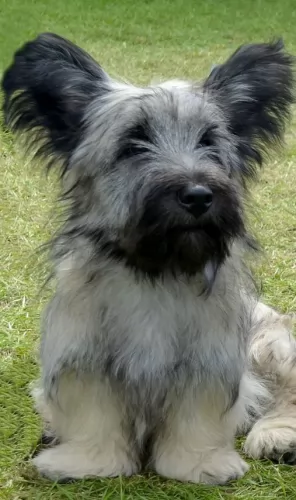 The Skye Terrier is a medium-sized dog standing at between 23 and 26cm in height and weighing between 12 and 18kg. The legs are short and sturdy. He is double coated with the top coat being straight and hard and forming a beard around the face area. The coat can be fawn, and in various shades of grey which are sometimes even black. The ears of the dog are medium sized and erect.
The Skye Terrier is a medium-sized dog standing at between 23 and 26cm in height and weighing between 12 and 18kg. The legs are short and sturdy. He is double coated with the top coat being straight and hard and forming a beard around the face area. The coat can be fawn, and in various shades of grey which are sometimes even black. The ears of the dog are medium sized and erect.
The Skye Terrier has always been a hunting dog and he enjoys quite a bit of exercise – walks, ball games as well as indoor games. Small though he may be, he is strong willed with a mind of his own and will benefit from being trained and socialized.
This is also necessary as he has a fairly reserved nature. He gets on well with children and makes an excellent family pet but he is ready to take on smaller pets in the home. He will bark when confronting strangers and makes an excellent watchdog too.
He is able to adapt well into life in the city or the countryside. He isn’t a dog to be left outside day after day and will just die of boredom, frustration and loneliness.
 Your Polish Hunting Dog is a great choice of dog as a family pet. Used as a hunting dog he will be thrilled if he lands up with a family who are active and outdoorsy types.
Your Polish Hunting Dog is a great choice of dog as a family pet. Used as a hunting dog he will be thrilled if he lands up with a family who are active and outdoorsy types.
You can always count him in when it comes to going for walks, hiking, cycling or running next to you when you go horse-riding.
The Polish Hunting dog is a stable, gentle dog and he has a whole lot of other wonderful attributes to his name. He is loving, loyal, courageous, friendly, social and companionable. And he's good looking. What a great pet this low maintenance dog makes.
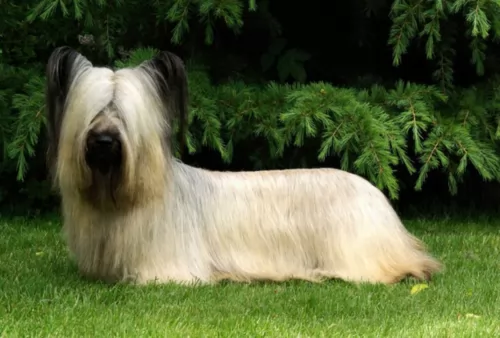 Give the Skye Terrier the attention he wants and he will reward you with his loving companionship.
Give the Skye Terrier the attention he wants and he will reward you with his loving companionship.
He loves the entire family but is best suited to homes where children have been taught to be kind to animals and to treat them with respect.
He has moderate energy levels and will expect you to give him a fair amount of exercise. The Skye Terrier can make an excellent companion for you and your family.
 They are generally a robust breed and can easily reach up to 14 years of age with good care. There are always some common dog illnesses that you can benefit from knowing about because then you can get your pet to the vet if he appears to be under the weather.
They are generally a robust breed and can easily reach up to 14 years of age with good care. There are always some common dog illnesses that you can benefit from knowing about because then you can get your pet to the vet if he appears to be under the weather.
Active dogs are always going to be exposed to parasites, whether they be ticks, fleas or worms. Right from word go, puppies are treated for worms, but it is important to treat your dog regularly for parasites. Speak to your vet about the best products.
Heatstroke is always a risk for dogs even in areas where the weather isn’t particularly hot. People think on overcast days they can leave their dog in the car while they go in to the shops. A temperature that seems mild to a human can be like an oven to a dog. Excess heat is deadly to a dog. Signs of heatstroke include drooling, panting, anxiety, collapsing and then death.
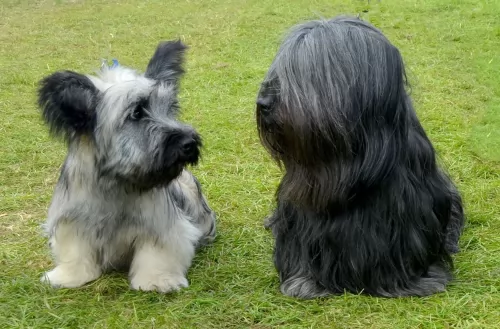 The Skye Terrier is a healthy dog breed. Perhaps the only issue that could be a problem with him is orthopedic problems. He is an achondroplastic dog, meaning a large body on small legs.
The Skye Terrier is a healthy dog breed. Perhaps the only issue that could be a problem with him is orthopedic problems. He is an achondroplastic dog, meaning a large body on small legs.
He could develop spinal problems if he were allowed to constantly be jumping off beds and high chairs.
Orthopedic problems affect the bones, muscles and joints and can actually be debilitating. Orthopedic conditions can be ligament tears or hip dysplasia for instance, accompanied by arthritis.
You’ll notice your dog has an abnormal way of walking or running, inability to get up once lying down and he may have arthritis and pain.Be careful because obesity can trigger problems with the joints and bones.
 The Polish Hunting Dog has always had an acute sense of smell, and with his long legs he has always been able to track his prey for many miles. This hunting has made him a dog that wants lots exercise and activities.
The Polish Hunting Dog has always had an acute sense of smell, and with his long legs he has always been able to track his prey for many miles. This hunting has made him a dog that wants lots exercise and activities.
As a pet, this dog will require a lot of exercise, being better suited to active, outdoor type of owners. He is therefore better suited to life in the country and large open spaces as opposed to living in the city.
Apart from brushing your pets coat twice a week, check him over for ticks if you want to avoid the spread of tick-borne diseases.
Check his ears, inside and out. Check inside his mouth for bad teeth. This is because your dog can’t tell you if he has pain, and toothache can be terrible for your pet and bad teeth can affect other body organs such as the heart and the kidneys.
Make sure your pets nails are trimmed.
Make sure your pet receives excellent food. If you’re going to be feeding your dog commercially manufactured dog food, make sure it is the best quality ones. Some of the other foods have ingredients in them which can cause your dog to get sick.
Try and give your dog some wholesome, home-made food. Boiled chicken, brown rice or pasta, carrots, sweet potato and spinach chopped up and added to the kibble will have your pet wagging his tail with delight. It will also be to his benefit to get some raw meat in from time to time.
Never leave your pet without a constant supply of fresh, cool water.
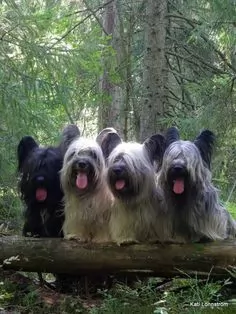 ● The coat of the Skye Terrier is long and silky and will most certainly require brushing every day if you keep the hair long. Such silky hair can easily become matted.
● The coat of the Skye Terrier is long and silky and will most certainly require brushing every day if you keep the hair long. Such silky hair can easily become matted.
● Little dogs like this will need their teeth being checked regularly. You can even try to buy special pet toothpaste and toothbrush and brush his teeth yourself. If you prefer, a professional dog groomer can do this for you and at the same time trim his nails and check his ears and clean the insides of the ears too to avoid infection.
● Provide him with top quality food as the quality of the dog food you buy makes a huge difference to his health and longevity. He is a small dog and there are some excellent commercially manufactured dog foods specially made for small, energetic dogs.
Try to include some home-made food for him which can be simply mixed into the dry kibble twice a week. Boiled chicken, brown rice or pasta and spinach, sweet potatoes and carrots is super tasty and nutritious. Ensure there is always a bowl of fresh, cool water within his reach.
● Keep his vaccines up to date against some deadly canine diseases, and get him to the vet when he shows signs of illness.